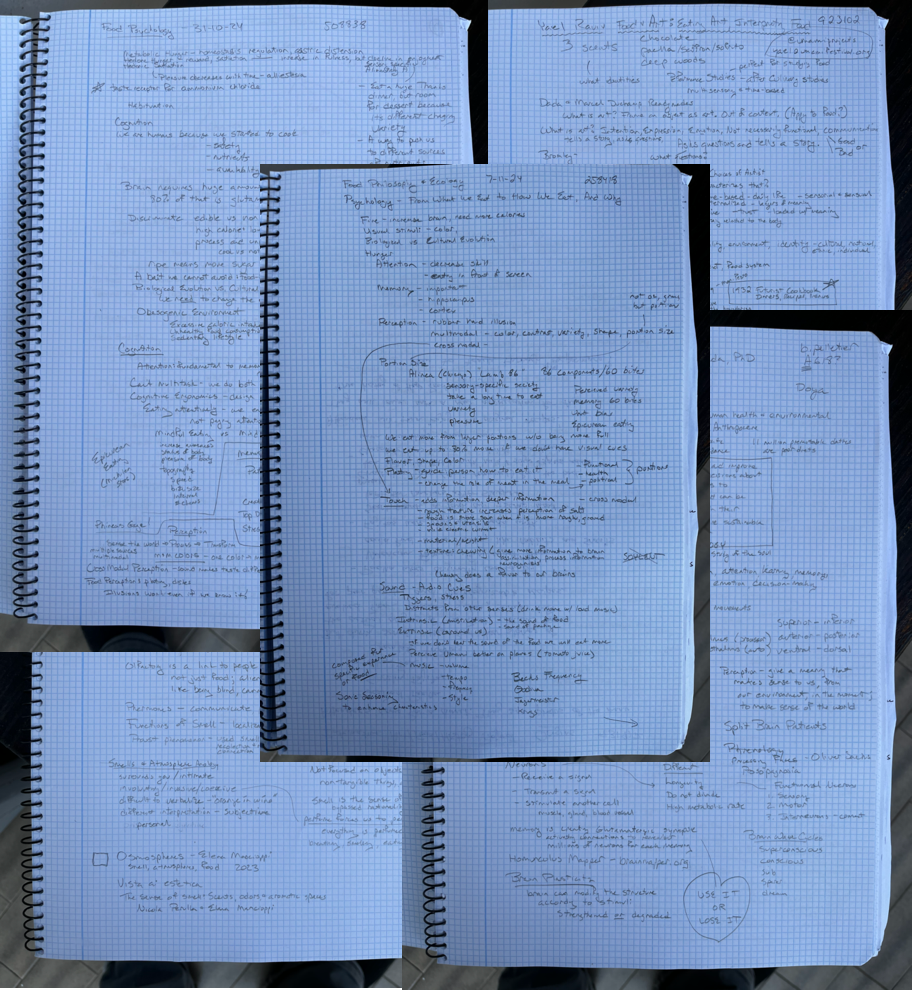Thank you so much for reading, and subscribing, and supporting. I can’t tell you how much it means to me!
I’m a long way from home, but I can still feel everything that’s happening since the election last week. Many people are feeling despair, many relief, many are still numb and unsure of what to feel at all. Here in Italy, and at University, the topic comes up sometimes, but not in depth, and not with great concern, especially compared to events in other countries, or the mind-blowing class we just finished. I do my best to stay connected in both worlds.
And so there is school, and lessons, and much to be learned. I arrived in Italy just over three weeks ago, and have completed two weeks of Uni (as the kids call it). Yes, technically there was a short week of orientation, but it’s been two weeks of classes.
So how’s it going, Brian? What’s it like?
To review (I think?), the Masters of New Food Thinking comprises six Modules, and each Module has a handful of Courses, and each Course is made up of consecutive Classes. The Classes are three hours long, in the morning and/or afternoon.
So far, so good, except no week is ever the same, as some days have only one class, which might be in the morning or the afternoon, and classes don’t start at the same time each day, and there are lots of extras. For instance, this past week we had 7+ classes:
Monday: Italian Language at 8:30a (this is optional, but great for non-Italians)
Tuesday: Arts, Crafts and Design at 1:30p, and then one hour about online library resources
Wednesday: ACD at 8:00a, and Food Philosophy and Ecological Perception at 2:15p, plus a lunch session on imposter foods (which turned out to be in Italian)
Thursday: ACD at 9:30a, and FPEP (with a different lecturer) at 2:00p
Friday: ACD at 8:30a
So one needs to pay attention to the schedule. Plus, one needs to look at the syllabus for each class, and instructor, to get the readings done, which might include scientific papers, magazine articles, and sections of books. It’s a lot, but I manage to squeeze those in during our generous lunch break or in the evenings, or sometimes on the weekend before the busy week.
(I should note that every lesson and reading usually references multiple other readings or books. One classmate started tracking the books referenced, and is up to 18 so far. That’s 18 BOOKS referred, recommended, or highly recommended, in less than two weeks.)
As was described to me by previous students, there are multiple challenges here. It’s great that we get three hours in each class to dive deeply into a subject, but it takes considerable mental energy to juggle deep dives in several subjects every week.
And, we experienced twice this week the end of a course — after hours of listening to an instructor and sharing in their class and coming to know them and love the subject, suddenly the instructors time is done, and they’re gone.
But then, of course, it’s a small school and a small town, and it’s easy to run into a professor and have an appertivo, or dinner, or to plan for the entire class to meet the next week because we didn’t really get a chance to present our assignments and fully wrap up the class, as we’re doing tomorrow.
All together, it’s a fire hose (I keep using that metaphor, for good reason) of knowledge and inspiration. I feel fortunate to arrive with several careers’ experience, and very often I can connect new learnings to things I already know or have done. Other times it’s totally new information. Both of these are wonderful.
Also, as expected, it’s not just the classes, it’s the classmates. We thirteen New Food Thinkers hail from Japan, Taiwan, India, Australia, South Africa, Belgium/Spain, Switzerland/Amsterdam, The Netherlands, and Italy, which brings a wonderful world-ful of experiences and perspectives and things to learn, including cooking techniques and recipes (coming soon, a recap of our lesson from Theresa on how to make the best risotto!).
But not just our class, and not just about food. The day after our American election, another masters’ student from Tel Aviv was lamenting how the Israeli Defense Minister was sacked and will be replaced by a puppet, which will lead to more death and destruction. And a recent graduate of the bachelor’s program from Ukraine told me how she is unsure of her next career step because she might not want to go back to her war-torn home country.
Which is to say, the world can be a pretty ugly place. But we all share the need to eat, not just for sustenance but for community. As José Andrés wrote in a recent substack, “A meal is never just a plate of food. It has the power to change the world, to bring people together, to tell the story of who we are and where we’re going.”
And that’s why I’m here.
###





Thanks for the fascinating description description of your program—how complex it seems! I’ve found that older students as a rule are more adept at learning than younger ones, mainly because they know themselves better and bring the various skill sets from their previous lives to class. But they can be tougher to teach because they have very clear ideas about what they want. I bet you’ll be the best student they’ve had.
...so enjoy your description of everything. Its like we are in class with you✏️📝